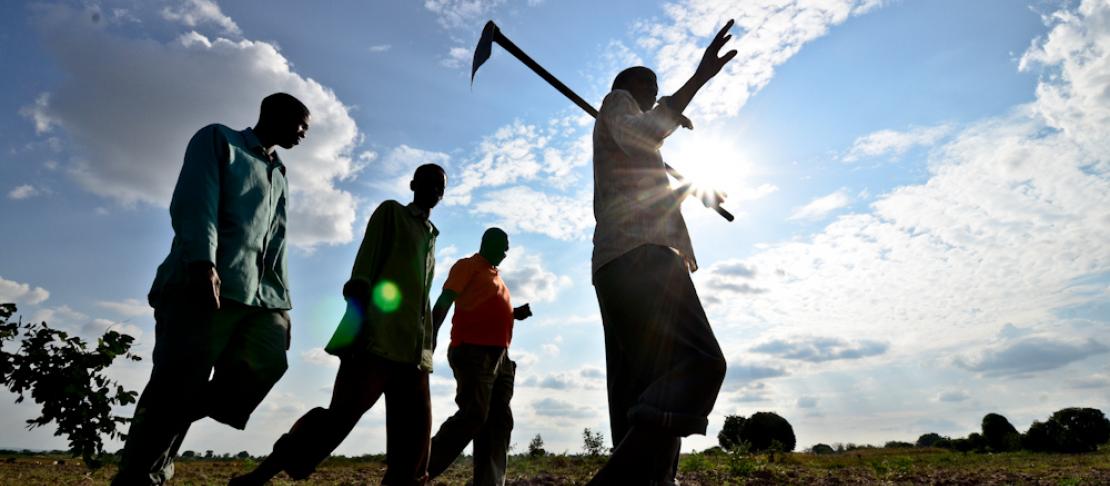Scaling up climate services in Tanzania

A new workshop method brings together climate forecasters and national policy-makers to dialogue, build common ground and agree on a national framework for climate services to get to millions of farmers in the country.
Edward Kapande vividly remembers the droughts that hit his community in 1989, 1992 and most recently 2009.
“We lost all our cattle. Yet we had been warned of the impending doom”.
He however remembers his educated uncle who sold his cattle when prices were still good; he had received advice from the forecasters and acted on them. Edward is chair of the Longido Community Integrated Program, a local Non-Governmental Organization working with the pastoralist community in Longido district, Tanzania.
For many farmers in Africa, erratic rainfall events have left them susceptible, with no guarantee of food availability in the coming months. The CGIAR Research Program on Climate Change, Agriculture and Food Security (CCAFS) research however shows this need not be the case. Climate information services can help farmers better understand, anticipate and manage the risks that a variable and changing climate brings to their livelihoods.
Edward notes that although climate services are important, his community will only benefit if the information is made less technical for all to understand; including the uneducated. His view was shared by a number of stakeholders from across climate, agriculture, health and disaster risk reduction communities who attended a consultative meeting for improving climate services in Tanzania held from 7 – 9 th May 2014.
A national consultation to get national policy-makers to agree to scale up climate services delivery for farmers
Tanzania’s national consultation workshop on climate services convened over fifty climate scientists, researchers, practitioners, farmers and national policy-makers from across the climate sensitive sectors (of agriculture, health and disaster risk reduction). They discussed climate service needs in the country; and agreed on a plan to scale up climate services for users. The meeting was a dialogue that brought climate scientists face to face with potential users of climate information and services, and built a common ground among them, enabling them to develop a common understanding and craft a joint agreement on how to work together to make climate services useful for vulnerable communities in Tanzania.
Watch Arame Tall speak about interaction between providers and users of climate information in Tanzania
The consultation meeting was held just two months following a first kickoff meeting held in February 2014. This meeting brought together government departments involved in the project and international project partners for a high level technical session.
Read more about the kickoff meeting: Climate Service Adaptation Programme in Africa kick off meeting in Tanzania
Key workshop outputs
Users were brought face to face with providers of climate services in Tanzania, to understand the range of products the Tanzania Meteorological Agency (TMA) has on offer and on the other end, have users expressed specific views on usefulness of each service.
“Through this facilitated dialogue we had the chance to hear from our users what kind of information they expect from us and challenges they face in the current setup of weather and climate services. We ultimately want to ensure our information reaches the end user; in a clear, simple and user friendly manner to facilitate decision making” said Dr. Ladislaus Chang’a from TMA.
Smallholder farmers in Tanzania are already using seasonal forecasts, and forecasts of the start and end of the rainy season, to aid in their decision-making. Smallholder farmers at the meeting asked for additional forecast information, including updates on the progress of the season, which are currently not reaching them. Pastoralists specifically asked for new information including wind forecasts from TMA, information on climate change impacts among others to be delivered at least one month before the rainy season. Warnings about Rift Valley fever outbreaks would also be appreciated by this group.
Key Recommendations
A key workshop recommendation was the creation of a national platform to serve as a forum for a sustained dialogue between users and producers of climate services in Tanzania. The main functions of the platform will include: continuous identification of user needs for climate services; communicating available TMA products and services to users in relevant sectors; identification of bottlenecks in improved delivery of climate services; making policy recommendations to the steering committee for climate services; and to consider appropriate mechanisms for developing climate services.
Filipe Lucio speaks about the objectives of the Global Framework for Climate Services program
CCAFS is one of the key partners in the Global Framework for Climate Services (GFCS) adaptation programme in Africa and is also serving on the project steering committee to guide project activities and implementation in Tanzania and Malawi between 2014 - 2016. Other partners include: World Meteorological Organization (WMO), CCAFS, the Centre for International Climate and Environmental Research in Oslo (CICERO), International Federation of the Red Cross (IFRC), the World Health Organization (WHO) and the World Food Programme (WFP).
Read more about the role of CCAFS in the GFCS project: Strengthening availability and use of climate services in Africa
View photos from the Tanzania workshop here:
Vivian Atakos is a Communication Specialist with CCAFS East Africa. Arame Tall is the Global Coordinator - Champion for CCAFS Climate Services. Alexa Jay is a Program and Communications Officer for CCAFS theme on Climate Risk Management.



